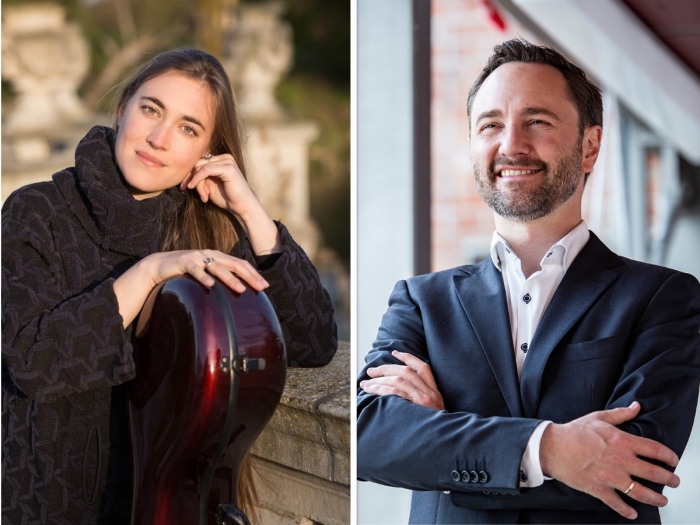On February 6 and 7, Thursday and Friday, at 8:00 p.m., the Orquesta Filarmónica de Málaga will perform Program 9 of its current subscription season at the Teatro Cervantes, under the baton of German conductor Alexander Merzyn.
The program will also feature a solo performance by Swiss cellist Nadège Rochat and will be dedicated to works by Reynaldo Hahn, Édouard Lalo, and Robert Schumann.
The first part will begin with the overture of Mozart, IRH 52, a piece by French composer of Venezuelan origin Reynaldo Hahn, which will be performed for the first time by the OFM.
A close associate of renowned writer Marcel Proust, Hahn was well-acquainted with the literary circles of the French capital, where he met librettist Sacha Guitry, with whom he collaborated on this work. It is a three-act musical comedy with only four characters, inspired by the figure of Mozart.
Dedicated to playwright Francis Croisset, the work premiered at the Théâtre Édouard VII in Paris on December 2, 1925, with vaudeville singer Yvonne Printemps in the lead role and maestro Raoul Labis in the pit.
Following this, the OFM will perform Édouard Lalo’s Cello Concerto in D minor, featuring Swiss cellist Nadège Rochat as the soloist.
Composed between 1876 and 1877, Édouard Lalo’s Cello Concerto is one of the most significant pieces in his catalog, second only to his famous Symphonie espagnole. It remains a favourite among cellists, and Lalo’s Spanish heritage is reflected in the Spanish influences found throughout the concerto’s various movements.
The concerto premiered at the Cirque d’Hiver in Paris in 1877, performed by Belgian cellist Adolphe Fischer, to whom the piece is also dedicated.
The second half of the concert will be entirely devoted to Robert Schumann’s Symphony No. 3, known as the Rhenish Symphony, one of the most important works of German Romanticism.
The symphony owes its nickname to the fact that it was composed in the autumn of 1850 while Schumann was serving as the musical director of Düsseldorf, a major city in the Rhineland along the banks of the Rhine River. The composer himself stated that the history and spirit of this majestic river and its people passed through his mind as he wrote the piece.
The work premiered on February 6, 1851, in Düsseldorf, conducted by Schumann himself, and was met with considerable success. Over time, the Rhenish Symphony has gained significant artistic recognition and is now considered one of the most distinctive and influential symphonic works of its era.
Alexander Merzyn has conducted numerous orchestras and soloists across Europe and Asia, developing a repertoire that spans from the Baroque era to contemporary music. Since 2020, he has served as the General Music Director of the Staatstheater Cottbus. Born in Kiel in 1983, he studied cello in Berlin under Jens Peter Maintz and initially played with the Deutsches Symphonie-Orchester Berlin and the Rundfunk-Sinfonieorchester Berlin. In 2009, he began studying conducting in Weimar with Nicolás Pasquet, Gunter Kahlert, and Anthony Bramall. His training was further enriched by masterclasses with Herbert Blomstedt, Sir Simon Rattle, Kurt Masur, Heinrich Schiff, and the Alban Berg Quartet, among others. In 2010, he won the MDR Conducting Competition.

Nadège Rochat is a distinguished voice among the young cellists of her generation. Her approach to interpreting well-known cello masterpieces, combined with her affinity for new compositions, has allowed her to explore a wide range of styles over the years. She shines a light on lesser-known works from the past and draws inspiration from traditional music from around the world and its performers.
Rochat has performed at prestigious venues such as the Tonhalle Zürich, the Musikverein in Vienna, the Konzerthaus Berlin, Carnegie Hall, the Mariinsky Theatre in St. Petersburg, the Palau de la Música Catalana, the Beethoven-Haus in Bonn, the Konzerthaus Dortmund, the KKL Luzern, the Palacio de Bellas Artes in Mexico City, and Victoria Hall in Geneva, among others.
She has collaborated with orchestras such as the Royal Scottish National Orchestra, the BBC Concert Orchestra, the Staatskapelle Weimar, the Orchestre de la Suisse Romande, the Dortmunder Philharmoniker, Yuri Bashmet and the State Symphony Orchestra of Russia, the Norddeutscher Rundfunk (NDR) Orchestra, the Bochumer Symphoniker, the Geneva Chamber Orchestra, the Toulouse Chamber Orchestra, and the Amadeus Chamber Orchestra of Polish Radio.

More information about the Orquesta Filarmónica de Málaga


























